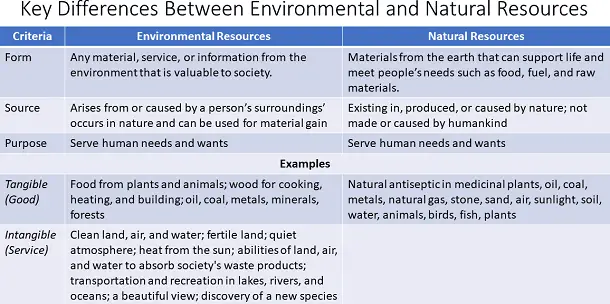What is the difference between environmental and natural resources? This article attempts to answer this question for lack of coherent explanation of the difference between these two concepts. Read on to find out.
I cannot find a straightforward reference online that explains the difference between environmental and natural resources. When I google “What is the difference between environmental and natural resources,” Out of the 816,000,000 results, I got the following meta-descriptions in the first few links:
- Define and identify types of natural resources. 2. Distinguish between renewable and nonrenewable resources. 3. Explain the difference between inexhaustible…
- The use and conservation of natural resources such as water, land, soil, plants, and animals affect a multitude of industries, from agriculture and mining to tourism, fishing, and forestry.
- The use and conservation of natural resources such as water, land, soil, plants, …
- This circular, cause-and-effect relationship between rural poverty and environmental degradation is apparent, unless degradation is addressed directly, the …
Clearly, all of these meta-descriptions do not distinguish environmental from natural resources. That means nobody wrote about the difference between environmental and natural resources although we usually see those phrases mentioned in the literature.
The Need to Define Environmental and Natural Resources
In teaching the economic valuation of environmental and natural resources as a subject in the MS in Environmental Management course, I find it necessary to distinguish “environmental” from “natural.” A crystal clear definition provides a solid foundation for the graduate students’ understanding of other concepts anchored on these key terms.
Is there a difference between these two words? Or are these words interchangeable? Why, in the first place, are these two words separated from each other?
This article aims to provide answers to these questions. And the best way forward is to find the differentiator of these two concepts. What criteria will separate the two concepts from each other?
Key Differences Between Environmental and Natural Resources
I gathered all the definitions I could find from encyclopedia, organizations, academic institutions, and even published scientific papers and synthesized them. I built a matrix of the differences using three key definition criteria and gave examples.
The main differences are shown in the table titled “Key Differences Between Environmental and Natural Resources” with examples to distinguish environmental from natural resources. I compared them in three respects: form, source, and purpose and listed the examples given in the references.

We can see from the table that there are overlaps in the definitions of environmental and natural resources as well as the examples. Hence, the confusion on the difference between these two concepts.
However, you will notice that natural resources do not include “services,” instead, refers to only the tangible things that benefit humankind. It does not have a description of or reference to quality as environmental resources do. Environmental resources combine what is naturally found in the world and human ingenuity.
Natural resources are not made or caused by humankind, but environmental resources can be caused by humankind (e.g., transportation and recreation, a beautiful landscape, discovery of a new species).
Key Takeaways
In general and to sum it all up, the definitions and descriptions show that environmental resources encompass those that occur naturally in nature and those where human ingenuity is applied. Environmental resources include natural resources and human efforts or influence to add more functionality to them as they were found in nature.
For all intents and purposes of defining these terms, a common purpose or central theme emerges, i.e., the environmental and natural resources are there to serve human needs and wants. Hence, in economic valuation as a branch of environmental economics, these resources will have to be valued to manage them efficiently and effectively.
References
Article
Băcescu-Cărbunaru, A. (2018). Global Demographic Pressures and Management of Natural Resources–Foresights about the Future of Mankind. Revista de Management Comparat Internațional, 19(1), 40-53.
Web
encyclopedia.com
investopedia.com
nationalgeographic.org
stats.oecd.org
yourdictionary.com
https://scdhec.gov/sites/default/files/Library/OR-0689.pdf
© 2020 September 28 P. A. Regoniel

